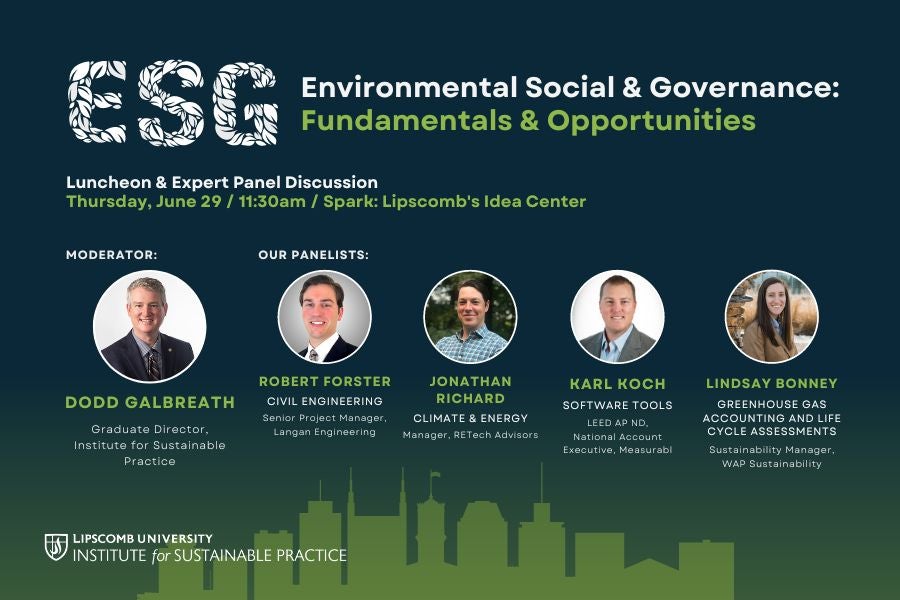Sustainability has to be “the root” of ESG
June 1, 2023

Written by G. Dodd Galbreath, Graduate Director, Institute for Sustainable Practice
It is true, we sustainability professionals love tree metaphors. There is no better symbol for relating the importance of reliability in environmental social governance (ESG) data than the image of a tree rooted into the Earth. Let’s first begin with a common understanding of what ESG means to us today.
Think of ESG as the green and social version of a financial statement. A financial statement documents data concerning the health or risk of a business to investors and stakeholders. ESG reports likewise provide data about broader risks that lead to financial risks. Investors and stakeholders of businesses are no longer satisfied with just knowing financial health. They want to know what is behind the financial numbers.
In the past, environmental risks (the E in ESG) provided insight behind the numbers but were much less complex than today’s ESG reports attempt to address. It was common to provide questions along the topics of water usage, reliability, compliance with current environmental laws or if building on a toxic site.
In fact, ESG reports were “seeded” by prior assessment systems such as environmental and regulatory due diligence, environmental impact statements, environmental assessments, site investigations, corporate social responsibility reports, to name a few.
Today, climate change, the shift from fossil fuels to renewable energy, and the need to restore or preserve our planet has increased the complexity of business risk. Today, we should ask: How much carbon emitting energy does our business and its suppliers currently use? Are we using energy inefficiently? How unpredictable is weather going to be and will it disrupt the basic resources used in our products?
Then, we added social risk (S) and governance risk (G) to this mix. Complexity has new increased even further. Does the business impact vulnerable communities and environmental justice (S)? How do our best and brightest employees (S) feel about the company’s progress in reducing climate change; are they helping the company make progress or are they leaving for firms that do it better? How effective is our business governance structure in measuring and achieving progress (G)? Does our management team have sufficient financial incentives or disincentives to achieve results (G)?
The above questions illustrate not only the complexity of ESG but also why the format of ESG reports, the number of ESG measurement tools, and the quality of ESG expertise so widely vary. One professional recently related that “When it comes to ESG, it is the wild, wild, west.”
At the “root” of all ESG reports is therefore the need for trained sustainability professionals. These professionals have earned both fundamental and comprehensive competencies such as:
- a specialization
- a broad technical literacy in energy, buildings, water, food, zero waste, cities, infrastructure, and business
- critical thinking
- accurate communication skills
- systems thinking
This is why sustainability has to be “the root” of ESG.
Understanding sustainability is in fact the key to accurately assessing the risks in ESG data. It is very unlikely that an internal business team knows how to collect, assemble, analyze, interpret, organize, and convey concisely the right ESG data. Today’s ESG work requires professionals who can do this but who can also leverage your team’s unique knowledge. They must assess true ESG risks in the context of your specialized businesses, investors, and stakeholders values. Only then, can your ESG strategy really succeed. Without it, your risks may soon become a reality without solutions.
Further, in this moment of ESG’s early evolution, we must ensure that ESG is rooted deeply into what has always worked. This is the essence of sustainability and its triple bottom line approach:
- the planet (i.e., mimic regenerative and resilient systems)
- prosperity (i.e., rely on fundamentals of good business, profitability, and reinvestment)
- people (i.e., seek value, equity and justice for all relevant investors and stakeholders).
These systems work best when they are interconnected and integrated as in nature. Systems that are also rooted in true regenerative and resilient sustainability respond better to stresses and shocks.
Therefore, if sustainability is the root of ESG, then ESG itself must also be interpreted at this point in human history as a “seedling,” as it is young. ESG is an early successional forest of immature growth. These reporting frameworks will survive or die, re-emerge, evolve better, and reach new successive heights. We must learn from successful climate, social and governance solutions and their own evolving risks over time.
Please post your comments or email direct dodd.galbreath [at] lipscomb.edu (dodd[dot]galbreath[at]lipscomb[dot]edu) for questions about this blog.
Contact frank.osteen [at] lipscomb.edu (frank[dot]osteen[at]lipscomb[dot]edu) about Lipscomb’s Institute for Sustainable Practice MS, Dual MS/MBA graduate programs, and professional certificates in sustainability.
On Thursday, June 29 at 11:30 am, Lipscomb University’s Institute for Sustainable Practice hosts an in-person and online panel. Join us live at Spark: Lipscomb’s Idea Center in downtown Nashville for a free lunch and parking OR attend conveniently online.
This interactive audience discussion will address fundamentals and opportunities for ESG. A diverse, expert panel will briefly discuss unique ESG tools and frameworks used in civil engineering, energy, climate, software applications, accounting, and retail supply chains. The panelists are sustainability professionals with master degrees in sustainable practices. Each will share examples of the value they provide to their customers and partners. These panelists will answer your ESG questions and how you as a professional can attain the needed skills and credentials to succeed in ESG and other sustainability careers.
Register for ESG: Fundamentals and Opportunities

ESG Lunch and Panel event on June 29, 2023
College of Leadership and Public Service News